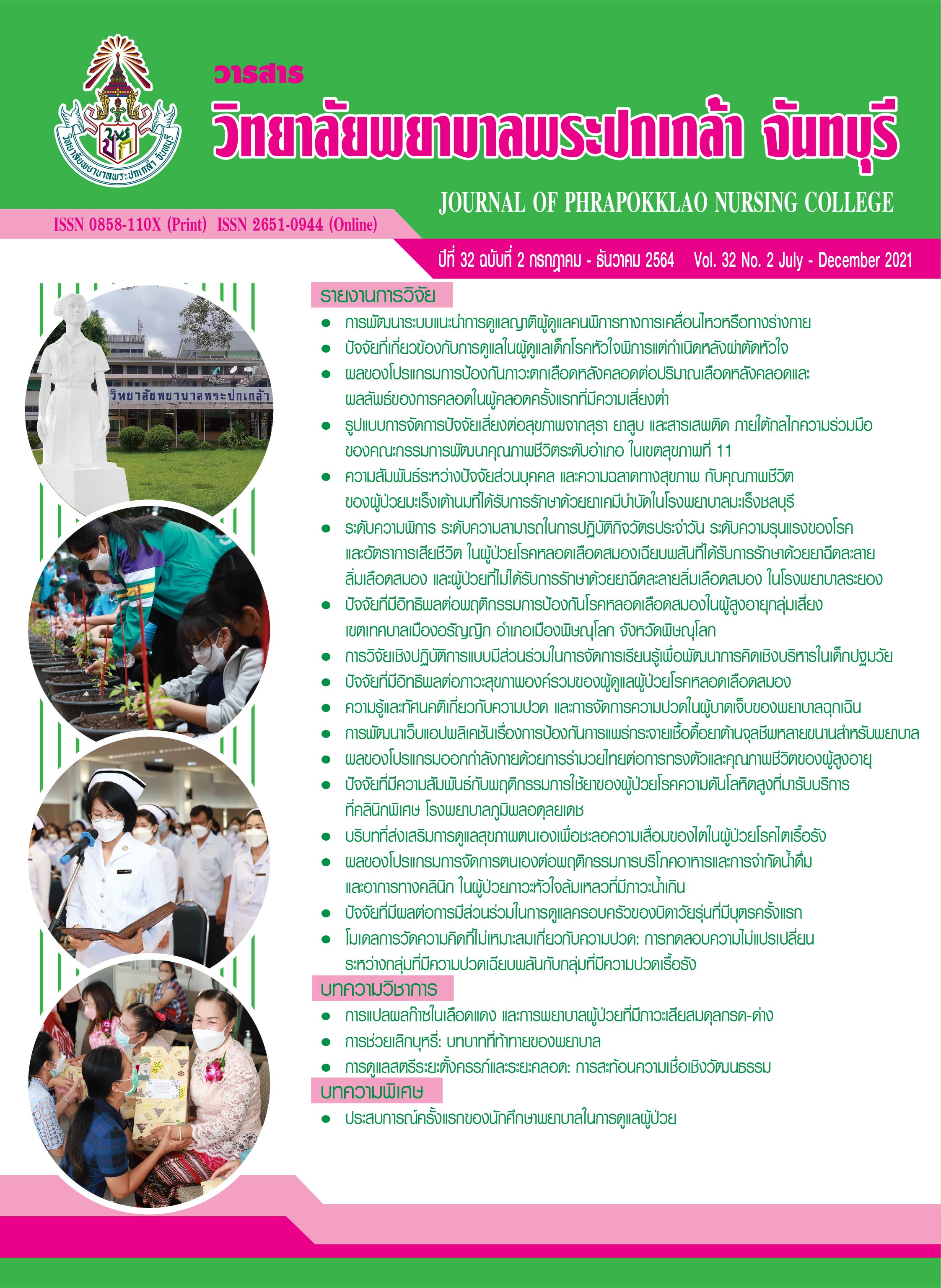Factors Influencing Father Involvement in Caring for Family among First-Time Adolescent Fathers
Keywords:
Adolescent fathers, Father involvement in caring for familyAbstract
This predictive correlational research aimed to examine father involvement in caring for family and its predicting factors among first-time adolescent fathers. Participants were 119 first-time adolescent fathers for which their wives received postpartum follow-up service at family planning clinics in Nakhonpathom Hospital and Ratchaburi Hospital. The research instruments included the demographic questionnaire, the experience of being nurtured by own father questionnaire with reliability as .81, the confidence of being a good father scale, the marital relationship questionnaire with reliability as .84, the stress questionnaire with reliability as .83, and the father involvement in caring for family questionnaire with reliability as .95. Data were collected from December, 2018 to August, 2019. Statistics used for data analysis included frequency, percentage, mean, standard deviation, and standard multiple regression analysis.
The research results revealed that the mean score of father involvement in caring for family among first-time adolescent fathers was 3.14 (SD = .30). Experience of being nurtured by own father, confidence of being a good father, marital relationship, and stress altogether accounted for 18.40% of the variance in father involvement in caring for family (R2 = .184, p < .001). However, only two variables statistically significant explained father involvement in caring for family. The most significant predicting factor was marital relationship (Beta = .345, p < .01) followed by confidence of being a good father (Beta = .182, p < .05).
This research suggests that postpartum care nurses should assess adolescent fathers about their marital relationship and confidence of being a good father. That would be a direction for nurse to encourage fathers’ marital relationship and confidence of being a good father leading adolescent fathers to involve in caring for their family.
References
กรมสุขภาพจิต. (2559). แบบสอบถามความเครียด (ST-5). สืบค้นจาก http://www.dmh.go.th/test/qtest5/
ชลดา สติปัญ, พรรณพิไล ศรีอาภรณ์, และนันทพร แสนศิริพันธ์. (2559). สัมพันธภาพระหว่างคู่สมรส ความรักใคร่ผูกพันระหว่างบิดากับทารก และการเข้ามามีส่วนร่วมของบิดาในระยะหลังคลอด. พยาบาลสาร, 43(พิเศษ), 71–81.
ชไมพร ใจแปง. (2555). ปัจจัยทางจิตสังคมที่เกี่ยวข้องกับการแสดงบทบาทการเป็นบิดาของบิดาที่มีบุตรอายุ 2–5 ปี ในจังหวัดนครศรีธรรมราช (ปริญญานิพนธ์ปริญญามหาบัณฑิต). กรุงเทพฯ: มหาวิทยาลัยศรีนครินทรวิโรฒ.
นิศาชล รักสกุล, พรรณพิไล ศรีอาภรณ์, และนันทพร แสนศิริพันธ์. (2562). ปัจจัยทำนายการเข้ามามีส่วนร่วมของบิดาในผู้เป็นบิดาครั้งแรกในระยะหลังบุตรเกิด. วารสารการพยาบาลและการดูแลสุขภาพ, 37(3), 144–153.
บุญฤทธิ์ สุขรัตน์. (2557). การตั้งครรภ์ในวัยรุ่น: นโยบาย แนวทางการดำเนินงาน และติดตามประเมินผล (พิมพ์ครั้งที่ 2). นนทบุรี: สำนักอนามัยการเจริญพันธุ์ กรมอนามัย.
ประเวศน์ มหารัตน์สกุล. (2557). หลักการและวิธีการเขียนงานวิจัย วิทยานิพนธ์ สารนิพนธ์. กรุงเทพฯ: ปัญญาชน.
ศุภกร ไชยนา. (2555). ความเครียด การสนับสนุนทางสังคม และการมีส่วนร่วมของบิดาในระยะหลังคลอด (วิทยานิพนธ์ปริญญามหาบัณฑิต). มหาวิทยาลัยเชียงใหม่.
ศุภกร ไชยนา, นันทพร แสนศิริพันธ์, และกรรณิการ์ กันธะรักษา. (2558). ความเครียด การสนับสนุนทางสังคม และการเข้ามามีส่วนร่วมของบิดาในระยะหลังคลอด. พยาบาลสาร, 42(1), 85–96.
สำนักงานปลัดกระทรวงการพัฒนาสังคมและความมั่นคงของมนุษย์. (2556). สภาวะการมีบุตรของวัยรุ่นไทย. สืบค้นจาก http://www.m-society.go.th
สำนักงานปลัดกระทรวงการพัฒนาสังคมและความมั่นคงของมนุษย์. (2557). สภาวะการมีบุตรของวัยรุ่นไทย. สืบค้นจาก http://www.m-society.go.th
แสงเดือน ศิริพร. (2559). ปัจจัยทำนายการมีส่วนร่วมของบิดาในระยะหลังบุตรเกิด (วิทยานิพนธ์ปริญญามหาบัณฑิต). มหาวิทยาลัยเชียงใหม่.
Authentic Masculinity. (2018). The five responsibilities of a father. Retrieved from https://authenticmasculinity.com/responsibilities-of-a-father/
Bandura, A. (1977). Social Learning Theory. New York: General Learning Press.
Brown, G. L., Kogan, S. M., & Kim, J. (2018). From fathers to sons: The intergenerational transmission of parenting behavior among African American young men. Family Process, 57(1), 165–180. doi:10.1111/famp.12273
Chu, H. S., & Lee, H. (2019). Relationship between paternal psychological distress and involvement in childcare among fathers of preschool-aged children: Mediating effect of maternal psychological distress. BMC Pediatrics, 19(308). Retrieved from https://bmcpediatr.biomedcentral.com/articles/10.1186/s12887-019-1688-z
Cohen, J. (1988). Statistical power analysis for the behavioral sciences (2nd ed.). New York: Erlbaum.
Faul, F., Erdfelder, E., Buchner, A., & Lang, A. G. (2014). G* Power Version 3.1.9.2. Germany: University of Kiel.
Gershy, N., & Omer, H. (2017). Engaging fathers in parent training: A qualitative study. Journal of Family Psychotherapy, 28(1), 38–58. doi:10.1080/08975353.2017.1283143
Goodall, J., & Montgomery, C. (2014). Parental involvement to parental engagement: A continuum. Educational Review, 66(4), 399–410. Retrieve from https://doi.org/10.1080/00131911.2013.781576
Hayward-Everson, R. A., Honegger, L., Glazebrook, A., Rabeno., S., & Yim, K. (2018). Predictors of father involvement in a sample of low-income men enrolled in a responsible fatherhood program. Social Work Research, 42(2), 84–94. doi:10.1093/swr/svy004
Hofferth, S. L., Pleck, J. H., & Vesely, C. K. (2012). The transmission of parenting from fathers to sons. Parenting: Science and Practice, 12(4), 282–305. doi:10.1080/15295192.2012.709153
Karami, M. (2017). Re: What’s the minimum sample needed for reliability check ?. Retrieved from https://www.researchgate.net/post/Whats_the_minimum_sample_needed_for_reliability_check/58a20b333d7f4b99233b6498/citation/download
Kroll, M. E., Carson, C., Redshaw, M., & Quigley, M. A. (2016). Early father involvement and subsequent child behaviour at ages 3, 5, and 7 years: Prospective analysis of the UK millennium cohort study. PLoS One, 11(9), 1–17. doi:10.1371/journal.pone.0162339
Kwok, S., Ling, C. C. Y., Leung, C. L. K., & Li, J. C. M. (2013). Fathering self-efficacy, marital satisfaction, and father involvement in Hong Kong. Journal of Child and Family Studies, 22(8), 1051–1060. doi:10.1007/s10826-012-9666-1
Lamb, M. E. (Ed.). (2004). The role of the father in child development (4th ed.). New York: John Wiley & Sons.
Lewin, A., Mitchell, S. J., Waters, D., Hodgkinson, S., Southammakosane, C., & Gilmore, J. (2015). The protective effects of father involvement for infants of teen mothers with depressive symptoms. Maternal and Child Health Journal, 19(5), 1016–1023. doi:10.1007/s10995-014-1600-2
Matlakala, F. K., Makhubele, J. C., & Mashilo, M. W. (2018). Challenges of teenage fathers towards fatherhood in Vaalbank, Mpumalanga Province. Gender & Behaviour, 16(3), 12013–12020.
Milkie, M. A., & Denny, K. E. (2014). Changes in the cultural model of father involvement: Descriptions of benefits to fathers, children, and mothers in parents’ magazine, 1926–2006. Journal of Family Issues, 35(2), 223–253. doi:10.1177/0192513X12462566
Murshid, N. S. (2016). Mothers’ empowerment and father involvement in child health care in Bangladesh. Children and Youth Services Review, 68, 17–23. doi:10.1016/j.childyouth.2016.06.026
National Library of Medicine. (2020). Adolescent development. Retrieved from http://medlineplus.gov/ency/article/002003.htm
Nelson, K. (2014). The everything father-to-be book: A survival guide for men (3rd ed.). Avon, MA: Adams Media.
Trahan, M. H. (2018). Paternal self-efficacy and father involvement: A bi-directional relationship. Psychology of Men & Masculinity, 19(4), 624–634. doi:10.1037/men0000130
Twamley, K., Brunton, G., Sutcliffe, K., Hinds, K., & Thomas, J. (2013). Fathers’ involvement and the impact on family mental health: Evidence from Millennium Cohort Study Analyses. Community, Work & Family, 16(2), 212–224. doi:10.1080/13668803.2012.755022
Downloads
Published
How to Cite
Issue
Section
License
Copyright (c) 2021 JOURNAL OF PHRAPOKKLAO NURSING COLLEGE

This work is licensed under a Creative Commons Attribution-NonCommercial-NoDerivatives 4.0 International License.
เนื้อความ ข้อมูล และรายการอ้างอิงที่ผู้เขียนใช้ในการเขียนบทความเพื่อลงตีพิมพ์ในวารสารวิทยาลัยพยาบาลพระปกเกล้า จันทบุรี ถือเป็นความคิดเห็นและความรับผิดชอบของผู้เขียน คณะผู้จัดทำวารสารไม่จำเป็นต้องเห็นพ้องด้วยหรือร่วมรับผิดชอบ
บทความที่ได้รับการลงตีพิมพ์ในวารสารวิทยาลัยพยาบาลพระปกเกล้า จันทบุรี ถือเป็นลิขสิทธิ์ของวารสารวิทยาลัยพยาบาลพระปกเกล้า จันทบุรี หากหน่วยงานหรือบุคคลใดต้องการนำส่วนหนึ่งหรือทั้งหมดของบทความไปเผยแพร่ต่อเพื่อวัตถุประสงค์ใด ๆ จะต้องได้รับอนุญาตจากบรรณาธิการวารสารก่อน



